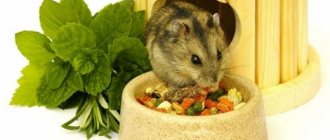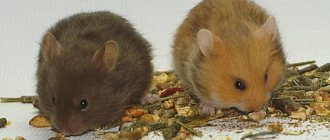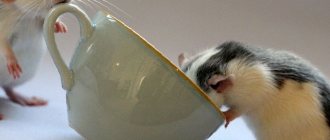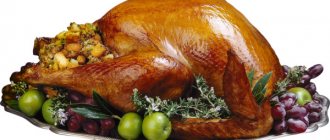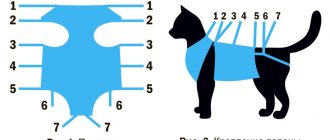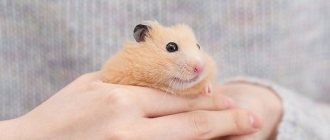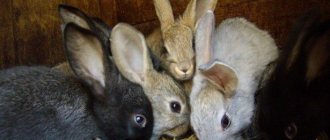/ Hamsters / Diet for Syrian hamster
0
2738
Article rating
The decision to have a pet, including a hamster, always requires responsibility. In order to raise a happy and healthy animal, it is important to know as much as possible about its contents. A person must clearly know what to feed a Syrian hamster at different stages of its life. Only then will the animal be much less sick, its activity will be within normal limits, and the joy of having it will not stop even after several years.
Diet for Syrian hamster
Nutrition for an adult hamster
In order to properly feed your pet, you need to take into account its age and health status. The animal’s diet may change depending on how the furry one feels and what period of its life it is currently in, whether the female is pregnant, whether the hamster is sick, and so on.
Basic diet
The Syrian hamster's diet is based on a grain mixture, which can be easily purchased at any pet store. It must be given twice during the day - morning and evening. Give no more than one tablespoon each time. In this case, it is important not only to feed the animal, but also to monitor whether the pet eats the entire portion.
There are cases when a hamster eats only its favorite treat, and scatters the rest of the crops around the cage or simply leaves it untouched. This behavior of a furry pet can lead to its development of obesity. The finished mixture provides a complete set of vitamins and minerals the animal needs, however, other products will also be useful for the animal’s high activity and good mood.
Dietary supplements
In addition to his favorite seeds and nuts, the Syrian hamster is also fed boiled peas and beans. It is also worth knowing that these animals love to eat green peas.
The pet's diet includes not only the above products. It also includes the following treats:
- Dried corn.
- Pumpkin seeds.
- Cashews, peanuts or walnuts.
- Dried fruits (raisins, dried apricots, dried apples, bananas, pears).
If a hamster has bowel problems, the owner should review the diet and change its composition. However, for initial normalization, it is worth adding a little sunflower oil to the food in case of constipation or a small amount of rice cooked until sticky in case of diarrhea.
Syrian hamsters: care and maintenance
Caring for hamsters is not difficult, so even children can handle it. The main thing is to choose the right cage, provide the hamster with proper leisure and proper nutrition.
Let's look at the main questions that concern the owners of a Syrian pet:
- Where should a hamster live?
Of course, you need to purchase a cage for a new family member. Make sure that its size is no less than 30 by 40 cm. A glass aquarium of the same size is also suitable for hamsters.
Use of fruits and vegetables
For proper nutrition of the Syrian hamster, it is important to give the animal not only grain crops, but also other products. Every day your pet needs to be given a small amount of the following products:
- Apples.
- Persimmon.
- Bananas.
- Pears.
- Carrot.
- Cucumbers.
- Pumpkins and zucchini.
- Bell pepper.
- Broccoli.
- Savoy cabbage.
All vegetables and fruits should be given in small quantities. It is also worth taking into account the fact that the Syrian hamster's activity reaches its peak at night. Therefore, it is recommended to feed your pet foods that can quickly spoil before nightfall. This will prevent poisoning of pet hamsters.
When caring for a hamster, you need to not only know what to feed your Syrian hamster, but also the amount of food to give. According to the advice of experienced breeders, the ideal amount of food would be such that it either runs out by morning or remains in small quantities.
What to feed an old hamster?
A hamster becomes an old man by the age of two years. The owner may observe lethargy in the pet, lack of appetite, and almost complete grinding of teeth. An animal at this age is no longer able to eat roughage, so the diet must be radically changed. Nuts and grains should be ground into a paste, and vegetables and fruits should be grated. You should not refuse ready-made dry mixtures: they support the normal functioning of the digestive system. Vegetable and meat baby porridges and purees are optimal for an old animal.
Other dietary supplements
The diet of domestic rodents consists not only of fruits, vegetables and grains. A complete Syrian hamster diet includes protein supplements, herbs and mineral supplements.
Use supplements
Squirrels
At home, meat, boiled eggs, cottage cheese, low-fat kefir, mealworms and fish are used as protein supplements.
It is necessary to feed exclusively fresh foods. The meat must be boiled without the use of salt and spices.
Vitamins
Periodically include herbs in the diet. The animal must be fed the following plants:
- dandelion leaves;
- alfalfa;
- clover;
- plantain.
You can get these herbs by germinating them at home. They can also be found as a product on the shelves of specialized stores.
Minerals
In order for the Syrian hamster to receive all the substances necessary for a healthy lifestyle, it is necessary not only to feed the pet correctly, but also to purchase a special mineral stone. Grinding your teeth against its surface and scratching will allow you to get the maximum amount of useful substances. Mineral supplements are used several times during the week.
Do not also forget about the constant availability of water for the animal. For domestic hamsters, purified water is used, which is poured into special drinking bowls. The use of automatic drinkers will prevent rapid evaporation of liquid and its spillage due to overturned dishes.
How to make a Syrian hamster at home?
At home, it is most convenient to keep hamsters in special cages or aquariums. The cage for a Syrian hamster should have dimensions of 30x30x40 cm or more, consist of durable metal rods and a plastic tray. The best bedding option is sawdust.
What you should equip your pet's cage with:
- A little house. Purchased or made yourself. If it is not fixed, the hamster will begin to move its housing throughout the cage.
- Toilet . You can purchase a special tray at a pet store or choose a suitable container yourself.
- Wheel. Running on such a simulator, the Syrian hamster will remain cheerful and healthy.
- Drinking bowl. A nipple drinker with a volume of over ten milliliters should be preferred to a bowl.
- Feeder. The range of such products is huge, so the choice depends entirely on your personal preferences.
- Perch and ladder. The hamster will be glad to have such accessories.
Hamster cage
Alternatively, buy a cage with all the contents.
Important! At an ambient temperature of 10 degrees C, the animal hibernates.
Nutrition of pregnant females
Females who bear their offspring need a slightly modified diet, as they require more nutrients and nutrients. Also, increasing the volume of food will remove one of the factors of concern for the female.
Basic diet
In order for a female Syrian hamster to endure pregnancy without harm to her health and the health of her babies, the following list of products must be included in her diet:
- Boiled chicken meat.
- Skim cheese.
- Boiled egg yolk.
- Sprouted grain crops.
- Greens, including salad.
- Gammarus.
- Earthworms.
- Grasshoppers and butterflies.
It is worth paying attention to the fact that grasshoppers and butterflies must be purchased exclusively in special stores.
Also in the cage must be a piece of coal, a mineral stone and calcium gluconate. This will allow the expectant mother to receive all the beneficial substances that she needs.
During pregnancy, not only proper nutrition is important, but also the absence of anxiety factors. To do this, remove the remaining hamsters from the cage with the pregnant female, and also refrain from contact with the newborn offspring.
Feeding the Cubs
The cubs of these domestic animals consume mother's milk during the first four weeks. After 30 days from the birthday, the main task of the owner is to provide the little pet with everything necessary. A bowl filled with various foods should always be full, and the hamster himself will choose what to eat.
Cubs should get everything they need
Basic diet
You can use milk formulas that the child eats, or offer the baby to eat canned food containing vegetables and meat. Also a good option for feeding children is a mixture of meat puree and steamed buckwheat or oatmeal flakes. In order for the baby to get used to the new food, put it in the mother's feeder.
What to feed the baby?
A small hamster has a very delicate digestive system, so it needs to be fed differently than an adult animal. A baby up to three months old eats often, but little by little. There should always be a dry grain mixture in the feeder, although many babies do not really like to feast on it. It is advisable to give your hamster one product per day from fresh greens, so as not to provoke intestinal upset. For the same reason, you should not treat him with exotic fruits. You can sprout lettuce, wheat, beans, and peas for the baby. Young shoots are easily digestible and rich in microelements necessary for the full growth and development of the animal. Regular baby food that combines meat, cereal and vegetable ingredients is well suited for a newborn animal. Baby porridge or puree is placed in a bowl and placed directly in the cage.
Nutrition for an elderly animal
A hamster that is showing signs of aging also needs an adjusted diet.
The main signals for adjustment are decreased activity, decreased appetite, and worn teeth. This period begins after two years of the animal’s life.
Correction means grinding grain crops and grinding vegetables. Also, experienced breeders claim that an older hamster can safely eat baby formulas to which special vitamins have been added. Their presence will eliminate disruption of digestive processes.
Feeding a sick animal
No one doubts that animals that are weakened by disease must be shown to a veterinarian as quickly as possible. However, nutrition also plays a big role in the speed of recovery of your furry pet.
If a sick animal does not eat
Quite often, a sick hamster does not eat at all or eats very small doses. In this case, he has to be given food forcibly. To do this, grain crops are crushed, mixed with hot water or vegetables, bringing the grains to a puree state. Feeding occurs using a syringe.
It is also possible to use baby food to which special vitamins have been added. Recovery can speed up a decoction of chamomile. It is necessary to feed the animal with great care so that the hamster does not choke.
Contraindicated products
There are a number of prohibited foods for hamsters.
At first glance, they are quite harmless, but they can have a negative effect on the body of this animal, which can be fatal.
The list of what you cannot feed to your pet includes:
- Food for other types of rodents or parrots.
- Potatoes, acorns, chestnuts.
- Products containing more than 3% fat.
- Spices.
- Almond.
- Dairy products.
- Juices and sweets.
- White cabbage.
- Onion and garlic.
- Exotic fruits, citrus.
- Fruit seeds and seeds.
- Insects that are not typical for feeding this species in natural conditions.
- Canned, smoked, fried or stewed foods.
- Butter.
By remembering this list of contraindicated foods, you can easily provide your furry pet with the nutrition that will have the most positive effect on it.
